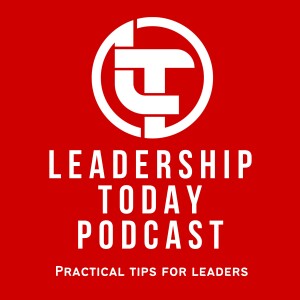
Leadership Today - Practical Tips For Leaders
Business:Management

Having a mentor provides a wide range of benefits beyond development, including higher pay, more promotions and greater career satisfaction. But asking for a mentor isn’t always easy or the best approach.
Transcript
Welcome to episode 18 of the Leadership Today podcast. Today we’re looking at finding a mentor, and why asking someone to be your mentor may not be the best approach.
Let’s start by defining mentoring. In a mentoring relationship the focus is on development of the person being mentored in a particular set of skills or capabilities, by engaging with a mentor who has demonstrated experience and expertise in these areas. Sometimes the individuals arrange the mentoring directly with each other, and at other times organisations either support or drive these pairings.
Reseach suggests that the benefits of having a mentor go beyond the individual’s development. When compared to those without mentors, those being mentored had higher remuneration, were offered more promotions, and they demonstrated greater career satisfaction and commitment.
And mentoring also has benefits for the mentor as well. Mentors report feeling more positive about the organisation and their senior leadership. Mentors also experience greater levels of job satisfaction.
Given mentoring is such a win win, why don’t we see more mentoring in the workplace? Here are some reasons:
People are often afraid to ask for a mentor - plucking up the courage can be hard, particularly when we recognise it’s such a big commitment from the mentor Mentors are reluctant to commit time - the traditional model of mentoring often soaks up a lot of time, sometimes outliving its original usefulness Mentors may already have someone to mentor - they may therefore be reluctant to commit to a second or third person
So my advice - if you want a mentor, don’t ask for one - at least not straight away. Here’s a process I recommend:
Identify the areas you want to develop - be really clear about what mentoring is going to address Identify a range of mentors that could help - it may be more than one person, and you can draw on your networks to suggest people Request brief meetings with the potential mentors of around 20 to 30 minutes each - be clear that you have an area you’re interested in developing, and would like a conversation about their advice and guidance in this area - being willing to use phone or video calls will broaden the potential range of mentors you can access Assuming they’re okay to meet up and the meeting goes well, ask if they would be open to another meeting in two months time Don’t waste their time - turn up prepared with questions, take notes and stop asking for more meetings once you’ve learned what you want to learn
Mentors are great. And, while it sounds counterintuitive, if you really want a mentor, don’t start by asking for one. As always, I’ve included the references used in this podcast in the episode notes.
References
Allen TD1, Eby LT, Poteet ML, Lentz E, Lima L. (2004) Career benefits associated with mentoring for protégeé: a meta-analysis. Journal of Applied Psychology Feb;89(1):127-36
Rajashi Ghosh & Thomas G. Reio Jr. (2013) Career benefits associated with mentoring for mentors: A meta-analysis. Journal of Vocational Behavior 83 (2013) 106–116
Sange, Rabiya; Srivasatava, R. K. (2012) Employee Engagement and Mentoring: An Empirical Study of Sales Professionals. Synergy (0973-8819);Jan2012, Vol. 10 Issue 1, p37
More Episodes
 2019-02-17
2019-02-17
 2019-02-03
2019-02-03
 2019-01-27
2019-01-27
 2019-01-13
2019-01-13
 2018-12-02
2018-12-02
 2018-11-25
2018-11-25
 2018-11-18
2018-11-18
Create your
podcast in
minutes
- Full-featured podcast site
- Unlimited storage and bandwidth
- Comprehensive podcast stats
- Distribute to Apple Podcasts, Spotify, and more
- Make money with your podcast
It is Free
- Privacy Policy
- Cookie Policy
- Terms of Use
- Consent Preferences
- Copyright © 2015-2024 Podbean.com





